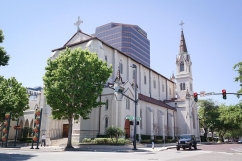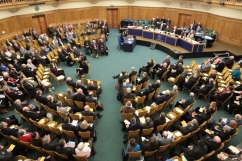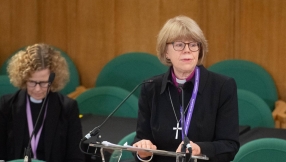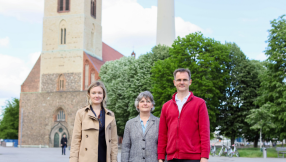
It's a story that regularly makes the papers, particularly on a slow news day: someone is outraged after the local vicar refuses to baptise their child because the parents are unmarried/divorced/gay/don't go to church.
This week's victim is Rev Tim Hayes of Dukinfield, Manchester. He is said to have refused to baptise the child of unmarried parents. He says he just wanted them to understand what baptism was all about: it's not just a naming ceremony. Furthermore, marriage is important too, and if the couple can't afford the cost of a wedding he'll do it for free.
What he almost certainly didn't say was that he wouldn't baptise the child, and he has been backed up in that by the Diocese of Manchester. Church of England law (Canon B 22.4, if you are interested) says: "No minister shall refuse or, save for the purpose of preparing or instructing the parents or guardians or godparents, delay to baptise any infant within his cure that is brought to the church to be baptised, provided that due notice has been given and the provisions relating to godparents in these Canons are observed."
On its FAQs about Baptism page, the Church says: "The Church of England welcomes all babies, children and families for Christenings – whatever shape that family takes. You do not have to be married to ask for a Christening for your child. You do not have to have been a regular churchgoer – as parents, you do not even have to have been Christened yourselves. Everyone is welcome at their local church."
Reading between the lines, what seems to have happened is that a sincere desire to instruct parents in the meaning of baptism and marriage has been taken as a refusal. That's a pity, but it illustrates one of the dangers of practising infant baptism in a post-Christian society.
In the early days of our faith, baptism was for believers. The Church grew by conversion, and adult baptism was the norm. As it became established and society became 'Christian', the children of believers were baptised into the Church as well and a rich theology of infant baptism developed.
It all sort of worked, as long as society remained broadly Christian. Baptism, the rite of initiation into the Church, was a mark of citizenship, not just of religion – though my own Baptist spiritual ancestors broke with this consensus because they saw so many people who were baptised 'Christians' but living thoroughly Godless lives.
For those who practise infant baptism, however, the problems come when a church has an inherited belief that everyone's children should be baptised, but an increasing awareness that most people don't know what it means and have no real wish to be part of a worshipping community.
So they're between the proverbial rock and hard place: either they just baptise all comers and ask no questions, or they try to engage them in deep theological stuff the parents haven't bargained for.
If it's the former, there's always the chance that a seed of faith might be planted in the participants and grow to bear fruit. I know personally of someone who came to faith because he acted as godfather to a friend's child and was challenged by the promises he found himself making.
If the latter, the minister's pastoral gifts are crucial. If someone desires to have their child baptised, it has to be clear from the outset that the answer is 'yes'. That welcome has to override everything else. If there are other issues – cohabitation, for instance – they might gently be raised as something to think about, but nothing should be said that casts doubt on the welcome.
Another victim of clergy reluctance to have made headlines this week is Mary Portas. She asked her local Catholic priest about baptising the child she had with her same-sex partner, and revealed the result at the Hay Festival. "I could see he was just uncomfortable," she said. In the end, she withdrew the request.
Now, as a Catholic priest, he had no right to refuse baptism to her child, and it's not clear that if push came to shove he would have done so. Speaking just last month at the ordination of 19 new priests, Pope Francis said: "It is never necessary to refuse baptism to someone who asks for it." However, this is another case in which personal theological difficulties have a disastrous pastoral consequence.
So what's the answer? There are three possible ways forward, one of them obvious, one of them radical and one of them very radical. The obvious one is that priests need better training. They need to be absolutely clear about what their Church does and doesn't believe about baptism, and commit to abiding by it. They also need to be trained in the art of pastoral conversation, so that they present themselves as people who are offering a gift rather than setting conditions.
The radical solution for the Church of England is to revoke Canon B 22.4. It is arguably a hold-over from the days of Christendom, when to be English was to be Christian and probably Church of England. But the Church could explicitly allow priests to use their own judgment about whether there is a sincere intention that a child will be brought up in a worshipping community as a believing Christian, with godparents who will pray for them and support their parents. This would help to restore meaning and dignity to a rite that lacks it when it's just a naming ceremony – as Rev Tim Hayes understands.
The very radical solution? Well, I'm a Baptist. That doesn't mean that I don't see the strengths of the infant baptism tradition, or that I think it's just plain wrong. I think a valid baptism requires two things: water applied in the name of the Trinity, and a personal decision to become a follower of Christ (which puts me at odds with the Catholic and High Church traditions). If those two things are separated by a few years, it doesn't worry me too much. But I'd like to see the baptism of believers become the norm in more and more congregations. This is now a missionary age. We're post-Christendom, and we'll grow by conversion or not at all. Believer baptism is a sign of the power of God at work in a person's life. I'd like to see it celebrated and normalised even in churches that traditionally haven't practised it.
Follow @RevMarkWoods on Twitter.
















